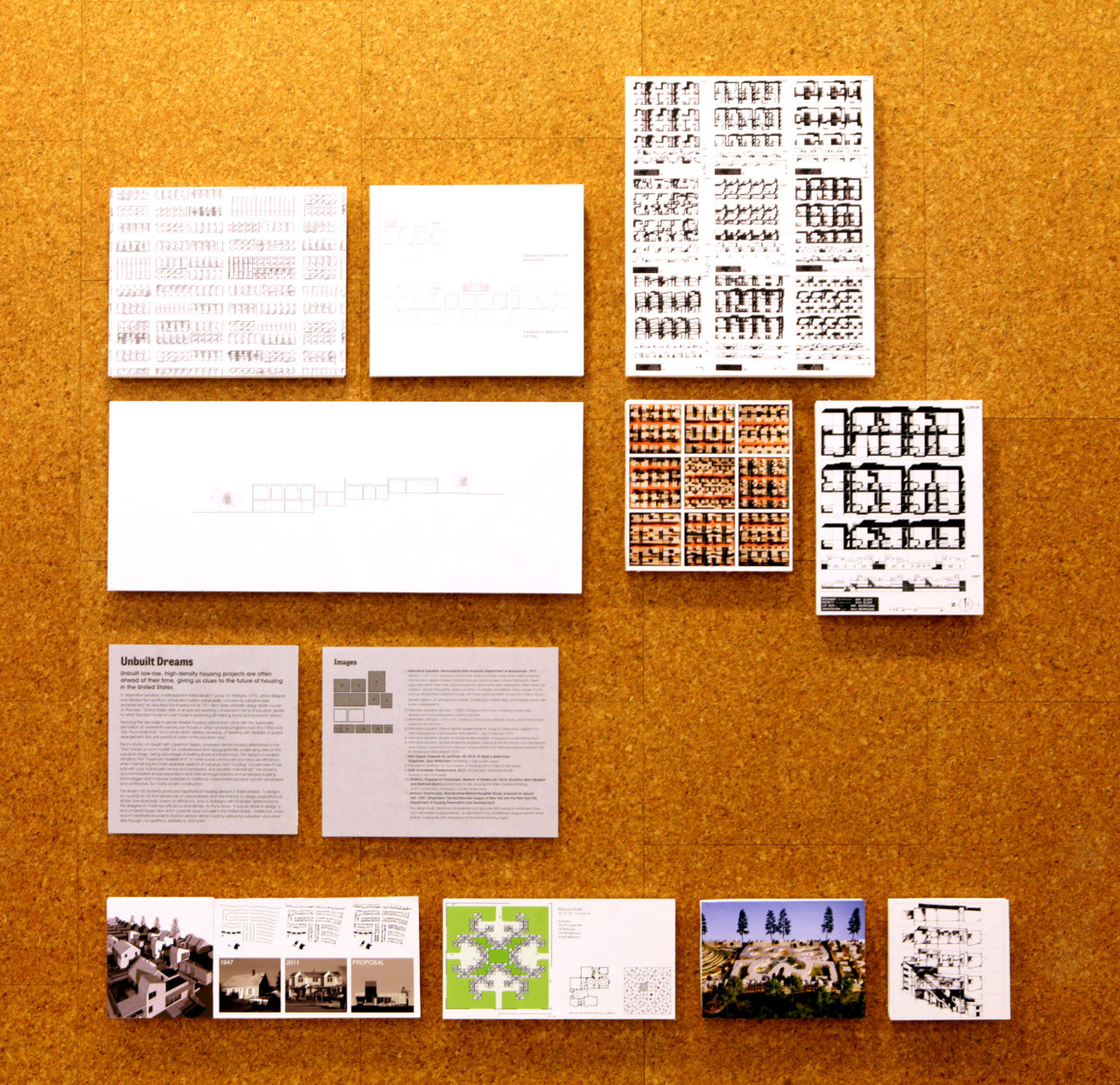Low Rise High Density examines a housing type celebrated in the 1960s and 70s, and what it means in the United States today. The exhibition presents original oral histories with project architects and global case studies from the last 50 years.
Forty years ago, low-rise, high-density housing offered a substitute for the high-rise model then dominating public housing in the United States. Dense enough to support public transportation, yet low enough to avoid dependence on elevators, the type attempts to bring together the benefits of urban and suburban living. Presenting architectural drawings, photographs, and oral histories with project architects, Low Rise High Density traces typology over time. The consideration of environmental and social ideas embedded in low-rise, high-density housing is as urgent now as it was when the typology was first developed. Today we can look at low-rise, high-density housing as an alternative to suburban sprawl.
Curator: Karen Kubey
Exhibition Design: The Letter D
Curatorial Team
Nicky Chang, Rebecca Costanzo, Arianne Kouri, Sarah Rafson, Sara Romanoski, and James Walsh
Research and Production Assistance
Oriana Cole, Luca Farinelli, Millay Kogan, Jeremy Lydic and Andrea Simone
Transcription and Translation
Elsa Brute de Rémur, Emjay Transcripts, Merran Swartwood, and Yvonne Zivkovic
-
SPONSORS
This exhibition is the first public program sponsored by the Institute for Public Architecture, a new organization promoting socially engaged architecture through urban research projects and a future residency program for design practitioners. By supporting architects and allied professionals working in the public interest, the IPA strives to improve our public realm.
-
FRIENDS
Belden Tri-State Building Materials; James McCullar Architecture, PC; Magnusson Architecture and Planning, PC; Rawlings Architects, PC; Tsao & McKown Architects
-
SPECIAL THANKS
The Architectural League of New York; Columbia Center for Oral History; Facoltà di Architettura, Cesena, Italy; Graduate School of Architecture, Preservation and Planning at Columbia University; Temple Hoyne Buell Center for the Study of American Architecture; Urban Omnibus
Low Rise High Density examines a housing type celebrated in the 1960s and 70s, and what it means in the United States today. The exhibition presents original oral histories with project architects and global case studies from the last 50 years.
Forty years ago, low-rise, high-density housing offered a substitute for the high-rise model then dominating public housing in the United States. Dense enough to support public transportation, yet low enough to avoid dependence on elevators, the type attempts to bring together the benefits of urban and suburban living. Presenting architectural drawings, photographs, and oral histories with project architects, Low Rise High Density traces typology over time. The consideration of environmental and social ideas embedded in low-rise, high-density housing is as urgent now as it was when the typology was first developed. Today we can look at low-rise, high-density housing as an alternative to suburban sprawl.
Curator: Karen Kubey
Exhibition Design: The Letter D
Curatorial Team
Nicky Chang, Rebecca Costanzo, Arianne Kouri, Sarah Rafson, Sara Romanoski, and James Walsh
Research and Production Assistance
Oriana Cole, Luca Farinelli, Millay Kogan, Jeremy Lydic and Andrea Simone
Transcription and Translation
Elsa Brute de Rémur, Emjay Transcripts, Merran Swartwood, and Yvonne Zivkovic
-
SPONSORS
This exhibition is the first public program sponsored by the Institute for Public Architecture, a new organization promoting socially engaged architecture through urban research projects and a future residency program for design practitioners. By supporting architects and allied professionals working in the public interest, the IPA strives to improve our public realm.
-
FRIENDS
Belden Tri-State Building Materials; James McCullar Architecture, PC; Magnusson Architecture and Planning, PC; Rawlings Architects, PC; Tsao & McKown Architects
-
SPECIAL THANKS
The Architectural League of New York; Columbia Center for Oral History; Facoltà di Architettura, Cesena, Italy; Graduate School of Architecture, Preservation and Planning at Columbia University; Temple Hoyne Buell Center for the Study of American Architecture; Urban Omnibus



